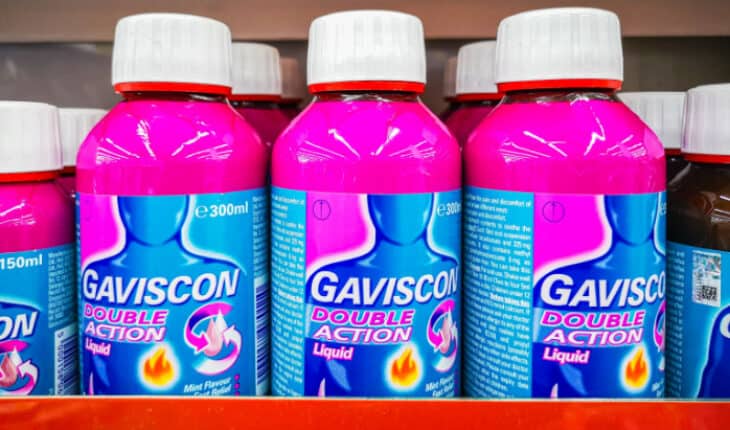Loyalty card data on over-the-counter medicine purchases could help spot ovarian cancer cases earlier, an Imperial College London-led study suggests.
The study of almost 300 women found that pain and indigestion medication purchases were higher in women who were subsequently diagnosed with ovarian cancer, compared to women who did not have ovarian cancer. This change in purchases could be seen eight months before diagnosis.
The first-of-its-kind study for cancer, published in JMIR Public Health and Surveillance, looked at whether there is a link between a diagnosis of ovarian cancer and a history of buying over-the-counter pain and indigestion medications, such as pain killers and digestive aids like antacids.
Symptoms of ovarian cancer can be unclear in the early stages of the disease, which leads to some people buying medication from a local pharmacy to alleviate their symptoms instead of visiting a GP, because they do not think their condition is serious. These early symptoms can include loss of appetite, stomach pain and bloating. This results in many people with ovarian cancer being diagnosed late, often when the cancer has already spread, and when their likelihood of survival has greatly reduced.
Ovarian cancer is the sixth most common cancer in the UK, with around 7400 people diagnosed each year and more than 4000 deaths each year from the disease. One in 5 women with ovarian cancer are diagnosed in A&E and many do not receive any treatment for their disease, often because they are too unwell by the time they are diagnosed.
The study findings could help to identify people who may have ovarian cancer at an earlier stage, which is one of the most effective ways to improve survival. 93% of people diagnosed with ovarian cancer survive their disease for 5 years or more if diagnosed at the earliest stage (stage 1) compared to just 13% when diagnosed at the latest stage (stage 4).
Dr James Flanagan, lead author for the study, from Imperial’s Department of Surgery & Cancer, said: “The cancer symptoms we are looking for are very common, but for some women, they could be the first signs of something more serious.
“Using shopping data, our study found a noticeable increase in purchases of pain and indigestion medications among women with ovarian cancer up to 8 months before diagnosis, compared with women without ovarian cancer. This suggests that long before women have recognised their symptoms as alarming enough to go to the GP, they may be treating them at home.
“As we know early diagnosis of ovarian cancer is key to improving chances of survival, we hope this research can lead to ovarian cancer symptoms being picked up earlier and improve patients’ options for treatment.”
The study – by researchers from Imperial College London, UCL and the University of Birmingham, funded by Cancer Research UK – included loyalty card data from two UK-based high street retailers of 283 women. Of these participants, 153 were women who had been diagnosed with ovarian cancer, and 120 were women who had not. The researchers studied six years’ worth of purchase histories from the women.
Participants were also asked to complete a short questionnaire about ovarian cancer risk factors, along with the symptoms they experienced (if any) and the number of visits to their GP in the year leading up to cancer referral or diagnosis for cases.
On average, participants with ovarian cancer began to recognise their symptoms about 4 and a half months before diagnosis. Of those who visited a GP to check their symptoms, the first visit occurred, on average, about 3 and a half months before diagnosis.
The researchers note that more research is needed to confirm their findings, and they hope that larger studies with patients diagnosed at different stages will be able to support and strengthen these results.
It is also hoped that this research could lead to the future development of an alert system for individuals to help them to seek medical attention for symptoms of cancer, or other diseases, sooner than they might otherwise do.
The research team has been funded by Cancer Research UK to continue this work by investigating whether purchases of over-the-counter products could be used in a similar way for other cancers, such as stomach, liver, and bladder cancers – all of which also commonly have non-specific symptoms.
Dr David Crosby, Head of Prevention and Early Detection Research at Cancer Research UK, said: “Today, in the digital age, we live with a wealth of data at our fingertips. Studies like this are a great example of how we can harness this information for good and help us detect cancer earlier.
“It’s incredible to think that this innovative study using loyalty cards, something most of us carry in our wallets, could help women with ovarian cancer which is often diagnosed late and mimics the symptoms of other, more benign conditions.
“Whilst further research with more patients is needed, this study indicates exciting potential for a new way to detect cancer earlier and save lives.”
Fiona Murphy, an ovarian cancer patient representative who helped develop the study, said: “I lived on Gaviscon for 18 months prior to my ovarian cancer diagnosis, it went everywhere with me due to severe acid reflux. Had this been associated with ovarian cancer, I would have had a faster diagnosis, far less surgeries and better fertility options.
“I wanted to help with developing this study because I had the wrong diagnosis for nearly two years. If there is a way to get an earlier diagnosis, I want to help people who are in the same position I was in.”
Fiona was diagnosed with mucinous ovarian cancer in 2008 after being symptomatic for nearly 2 years. She was not one of the 283 participants whose loyalty card data was used for the study.
- Gut microbiome could delay onset of type 1 diabetes - 3rd April 2025
- The da Vinci 5 Robot Is Set To Transform Bariatric Care: - 31st March 2025
- Beyond money: the hidden drivers fuelling child food insecurity - 31st March 2025






